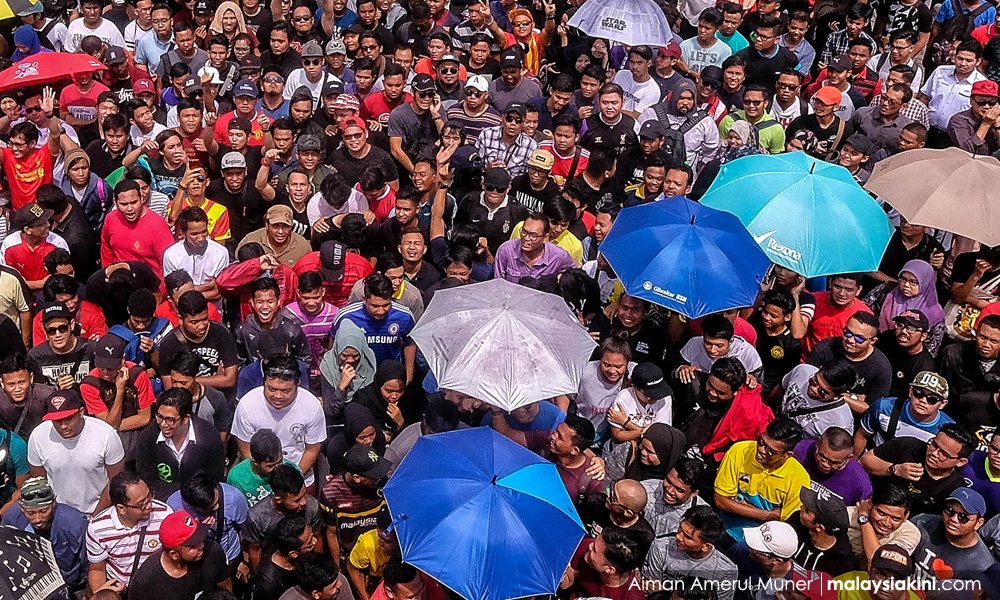
YOURSAY | ‘It would help all deserving ones, the majority of whom are bumiputeras.’
Leon Moch: Does Malay Economic Action Council (MTEM) CEO Ahmad Yazid Othman understand what “needs-based” means?
He's saying that bumiputeras are still lagging in this and that. If he is right, then the bumiputeras will be the ones receiving help, as they would be the needy ones.
Unless he thinks that when needs-based affirmative action is instituted, somehow data will show that the bumiputeras may not be as needy as they claim to be and would therefore receive less than what they are getting now?
He mentions that discounts for bumiputeras are to compensate bumiputeras for the lower value of bumiputera lots due to limited demands owing to resale restrictions. What warped logic.
If there hadn't been the creation of bumiputera lots in the first place, there wouldn't have been resale restrictions and thus no need for the so-called "compensation". Perhaps he is mistaken about the rationale for bumiputera housing discounts.
Cocomomo: A needs-based policy will help all deserving ones. Based on numbers, the bulk who will benefit will be bumiputeras.
Anonymous 2327531438397239: Isn’t it ironic that Ahmad Yazid is exactly what the race-based policies have produced - the never-ending demand for privileges and freebies?
What he fails to acknowledge and mention is the fact that other communities have to work hard to earn, build and achieve what they have with blood, sweat and tears, as nothing in life comes free.
Or perhaps he thinks all the assets and monies these other communities have come directly from heaven?
Anonymous_1550204262: I agree with Ahmad Yazid, even though it does not make any sense.
PKR president Anwar Ibrahim's policy will expedite the return of the opposition and they, under the pretence of looking after race and religion, will loot the coffers and leave the average Malays stranded again.
Nothing will change as long as the Malays do not wake up and realise politicians do not have their welfare in mind. How else can you explain PAS being so powerful despite ruling the poorest states in Malaysia?
Frankie: Ahmad Yazid, you acknowledged that BN, especially Umno, has failed to close the gap with the race-based policies, but do you know why?
It is because politicians are selfish and power-crazy, and they'll resort to screaming about protecting their races as a disguise for them to seek their own gains.
It didn't only happen to Umno and the Malays, look at MIC and the Indians. Race-based policies, even if implemented properly without loopholes, can never be on par with merit-based policies.
David Dass: There are two million young Malaysian professionals working abroad. Most will not return.
I just returned from Brisbane, Australia where my younger brother underwent bypass surgery in the Princess Alexandra Hospital.
I must confess that I have never experienced such a combination of competence, efficiency, courtesy and effective communication. All staff including doctors, nurses, dietitians and orderlies displayed the utmost courtesy and professionalism.
The head of cardiac surgery was half-Malaysian, the cardiologist in charge was Malaysian, the stroke doctor and house doctor were Indian. There were staff from China, Vietnam, Korea and many nurses from Kerala.
Singapore's development in large part owes much to Malaysian talent.
No one would oppose policies aimed at ensuring that Malays and other bumiputeras get their fair share of opportunities that the nation presents, but that should be obtained by education and skills training.
The government should also encourage savings, investment and also multiracial ventures designed at ensuring the mix of skills and talents that reside in every race. That will also ensure the transmission of knowledge, skills and experience required for business activity.
Malaysia My Home: This is the Never Ending Policy. Non-Malays have no choice but to live with this apartheid. Our fathers lived with it, and our children will have to live with it - if they stay in this land.
Those who can migrate, please do so. There is no point fighting the system here, the Malays will never let go of the ‘tongkat’ (crutch).
The only solution is for Malays to open their minds. But so far, I don’t think this is possible. This is the reality of Malaysian life.
Anonymous_1381287629: If Malays continue to think they do not have enough to start with and continue to have this mental brake, they will not grow and progress no matter how much help is given, even for 100 years.
Continuing to blame others, and carrying the ‘tongkat’ mindset will certainly worsen their progress. Sometimes, it is better to start from zero with no choice but to stand and fight.
This will make Malays more resilient, stronger and well-respected as fighters. It is sad to see this mentality continue to exist after more than 60 years of independence.
These are fundamental weaknesses which need to be addressed before any new policies can be effective. We are only treating the symptoms but not curing the patients. Sigh!
Veritas: This race-based formulation has been forever in the interest of Malay rentiers and plutocrats.
A needs-based approach could easily lead to ordinary Malays moving up, but we know that would be anathema to the elite Umno-PAS clique and the rentiers.
It would bring Malay incomes up because the vast majority of the B40 (bottom 40 percent) are Malays. But this would weaken the argument that Malays are falling behind or are still poor.
Also, a needs-based approach would take away resources from the parasitic class in favour of the orang biasa (ordinary people). So this is a very clever game.
These characters should not hide behind race. This formulation is similar to the right-wing populism of Donald Trump and many other countries, which aims to channel money to the one percent in hidden form.
A needs-based approach will help more Malays than a race-based approach. - Mkini



No comments:
Post a Comment
Note: Only a member of this blog may post a comment.